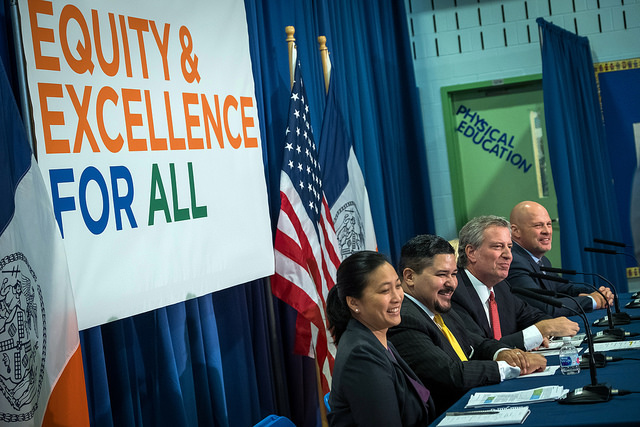
(photo: Ed Reed/Mayoral Photography Office)
For decades, decisions about education policy in New York have been filtered through state and local conflicts. Indeed, politics often dominates, divides, and obscures the conversation, causing many to lose sight of the most fundamental question for anyone who cares about education reform: how do students learn?
In looking for an answer, we found a school improvement framework that has the potential to unite all sides of the debate.
Our research team from Teachers College at Columbia University examined the implementation of a train-the-trainer model called Strategic Inquiry that was introduced in Renewal Schools, a Mayor Bill de Blasio administration initiative that included providing struggling schools with additional funding and support from the New York City Department of Education in an effort to improve student outcomes.
We found substantial improvements in student performance and school culture measures – at a low implementation cost and in a relatively short time-frame. Notably, these improvements were mostly achieved in schools with underperforming students and English language learners, two groups that have been traditionally hard to reach.
So how did this model work where others have failed?
Among other things, customization and buy-in from school leaders were key. Strategic Inquiry established a process that empowered teacher teams to identify specific students who have been historically underperforming. These teams then diagnosed and implemented what is needed to improve performance for those particular students. This, in turn, led to the improvement of school and district systems that have systematically contributed to those students’ challenges.
What also worked was Strategic Inquiry’s process of “getting small” by focusing on the precise things that evidence suggested students needed, rather than large areas dictated by accountability measurements. In other words, teachers and administrators identified breakdowns in learning and fixed them in real time as opposed to following an impersonalized reform plan dictated from above.
This study found several indicators of improvement in student achievement. After controlling for various factors, students in schools that adopted Strategic Inquiry principles were almost two-and-a-half times more likely to be on track to graduate and less than half as likely to be off track to graduate, compared to students in schools without this approach. Surprisingly, we observed these results despite the fact that the sample schools were only in the third year of implementation of a program designed to last five years.
In addition, teacher participation on inquiry teams was high, principal support for the program was strong, and educators reported extremely positive feedback about the support they received from Strategic Inquiry representatives.
There were no shortcuts. Investments in deep training of district and school-based leaders required the full engagement of educators. Teachers worked in partnership to study how students were struggling to learn. They designed and tested interventions, and applied what was working to improve the systems that had constrained students’ success. Engaged – and empowered – educators taught colleagues to do the same and spread the best practices across each building. This cycle worked to shift school culture and improve student achievement.
Strategic Inquiry shows that investing in the learning of educators can deliver real results in the learning of students. It offers optimism in achieving the highly-coveted, but often elusive outcome of improved student performance results in a relatively low-cost, minimally resource-intensive manner. It’s also worth noting that the program generated these positive outcomes while targeting some of the most difficult-to-reach student populations.
Without rendering judgment on the totality of Mayor de Blasio’s Renewal program, our study shows promising results for this model. It’s clear that there are some valuable components that succeeded and are worth pursuing and adopting elsewhere. Regardless of what type of school you prefer, Strategic Inquiry’s train-the-trainer approach ought to be part of the education reform toolbox for educators, policymakers, and parents alike.
***
Dr. Priscilla Wohlstetter is Distinguished Research Professor in the Department of Education & Social Analysis and co-author of a new report from Teachers College at Columbia University.
***
Have an op-ed idea or submission for Gotham Gazette? Email This email address is being protected from spambots. You need JavaScript enabled to view it.